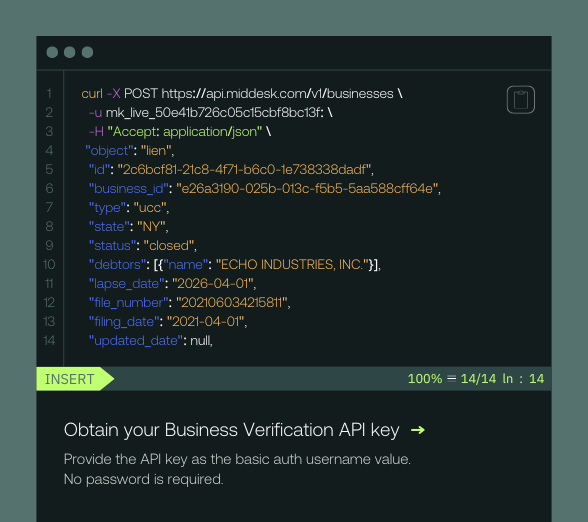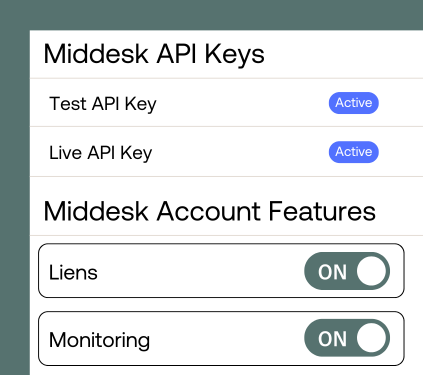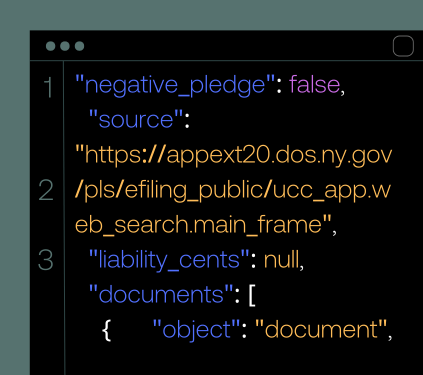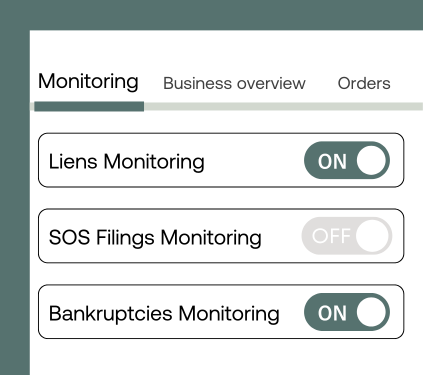A UCC Lien API that makes searching easy
With a direct line to government data that’s refreshed daily, Middesk’s UCC API & tax lien search get you the information you need for effective B2B onboarding.
Uplift in auto-
approvals
Coverage in the
United States
Businesses updated
<10 days
State business
registries
What is a UCC API?
A UCC API is a protocol that connects your KYB platform to databases containing information on Universal Commercial Code (UCC) liens filed against businesses and individuals. This helps to speed up credit risk assessment when conducting due diligence when onboarding a business in a B2B relationship.
A UCC lien represents a creditor's legal claim on a business or individual's property used as loan collateral in case of default. This lien establishes the priority order for creditors to seize a debtor's assets upon default, and sometimes specifies which pieces of property will be prioritized for seizure.

How the UCC API works

Step 1
Get your API key, and ensure your Middesk account is set up to access the Liens Search feature (and optionally, the Monitor feature).

Step 2
Middesk will retrieve data on any UCC liens filed against the business, including where it was filed, whether it’s still active, and how to contact the debtor and secured parties.

Step 3
Optionally, you can set the Monitor feature up with the “lien” event type to automatically notify you if the business has a new UCC lien filed against it or an existing one terminated.
Information you can get using our UCC search API
Middesk’s API is more than just a UCC search API. Here’s a list of other business identity verification and risk assessment information it can retrieve.
Middesk Business Verification Data Sources
Data You Can Access
What Do You Need to Know?
Liens, litigations, & bankruptcy
Does the business have UCC liens against it that list critical assets necessary for the business to operate as collateral? Is the business in the middle of a lawsuit that could cause a lien to be placed on its property? Has a business declared bankruptcy before, or is it in the process of filing for bankruptcy?
Knowing the debt amount, payment deadline, and collateral of a UCC lien against a business helps you evaluate how much risk the lien presents to the business – and, by extension, to your company in forming or continuing a relationship with that business.
Ongoing monitoring
Do I have a continuous process in place to monitor whether a business later files for bankruptcy or has a lien filed against them, even if I’ve already verified that they don’t currently?
Business verification information
Does the business have a physical address I can visit and other ways I can contact it? Is this information valid and the same as what the business told me?
Business documentation
Can I access and verify registration documents to know for sure if this business is legally allowed to operate? Does the business have the proper licensing it needs to operate in specific industries?
Industry classification
Is the business in an industry known to be risky, or one that my company doesn’t want to deal with for other reasons?
EIN / TIN (Business Tax ID)
Does the business have a tax ID number assigned to it by the IRS, and is the number valid and unique to that business?
People associated with the business
Do I know who the ultimate beneficial owners (UBOs) of the business are? Is their information on file valid, and does it match what the business told me?
Watchlist screening
Is anyone from the business on a sanctions list, a politically exposed person (PEP), or a relative or close associate (RCA) of a PEP? Does the business or anyone associated with it operate out of a country with a high risk of financial crime?
Web presence analysis
Does their website quality show any risk indicators that their business might not be in good standing?
Applications for a UCC Report API
Having a UCC report API to help evaluate business customer risk is helpful for many industries where due diligence is required.
Fintechs
The last thing a fintech company trying to grow needs is to onboard a business that may not be able to pay or borrow because its assets are tied up in liens and other debts. Using a UCC API helps fintechs see these potential risks before they make an onboarding decision.
Insurance Companies
A business having liens against it can be a significant risk signal for underwriters. Insurance companies can use a UCC lien API to get the information they need to determine how much risk those liens represent, and create that business’s policy accordingly.
Commercial Banks
Like fintechs, commercial banks don’t want to onboard business customers that are in financial trouble, in danger of losing their assets, or likely to default on their debts. Using an API to find UCC liens filed against a business lets banks find out how much financial risk they’re potentially taking on.
Lenders
Lenders need to know about any liens on a business because they indicate that others are ahead of them in line for being paid back if the business defaults. Using an API to find UCC liens helps lenders decide how much they’re willing to lend a business, or if they’re willing to lend at all.
Marketplaces
A business that has UCC liens against it is not only in danger of losing its assets, but also can find it difficult to get additional funding. A marketplace can use a UCC API to look for liens against a business and assess whether it’s likely to remain in operation for very long.
Payments Providers
Payments providers don’t want to be caught in the middle if a business customer in a marketplace can’t pay what it owes because it’s already too far in debt. So they can check a UCC lien API to determine whether or not a business is too risky to use their systems.
Efficient KYB & risk assessment made easy with UCC API
Get a critical risk signal for business CDD
Knowing the amounts, deadlines, and collateral of UCC liens against businesses helps you assess how likely a business is to default, where you stand in line to get your money or other assets back, and whether you’ll get your investments back at all.
Find data on tax liens as well as UCC liens
A business may have a lien filed against it because it’s late in paying taxes to state or federal governments. This presents another level of risk because governments are always paid back first in the event of a default. This leaves less room for you to recover your investments.
Speed up business risk assessment
Lien data can be complicated and time-consuming to find at official government sources like the IRS, Secretary of State offices, and state or county recorder offices. Use a lien API instead to search all of these places at once and get the information you need for KYB in mere minutes.
Rely on credible data from official sources
Middesk draws its lien data straight from U.S. government agencies and refreshes this data daily. That means you get up-to-date information about UCC liens from first-party sources.
Get started building with our easy-to-integrate APIs today
What makes Middesk’s UCC API different?

Current, first-party data
We have direct connections to all places UCC liens are officially filed – the IRS, SoS offices, and state/county recorder offices – so you get up-to-date data straight from trustworthy sources.

Finds both UCC and tax liens
Our lien API can handle requests for data on UCC liens, state/federal tax liens, or both – whatever data you need for due diligence and risk assessment.

Lien monitoring capabilities
We can automatically notify you if one of your business customers has a new UCC lien placed on it or has an old lien terminated. This lets you quickly reassess and adjust that business’s risk profile.

File a lien yourself
If you need to file or terminate a lien against a business, Middesk streamlines the process so there’s less manual work. We can even mask liens to help keep competitors away from your customers.
Frequently Asked Questions about UCC search APIs
A Universal Commercial Code (UCC) lien is a public legal notice that a private creditor has the right to claim a debtor’s assets as collateral if the debtor defaults on a loan. If a debtor has multiple UCC liens filed against it, the order they were filed determines which creditors get priority for claiming which assets.
Anti-money laundering (AML) regulations come with strict and swift penalties, and lack of knowledge about what your customers were doing is not an excuse for not complying. The best way to ensure you remain compliant after onboarding is including perpetual KYB as part of your overall KYB process.
A state or federal tax lien is a public declaration from a state or federal government that they have the right to claim an entity’s assets as collateral because that entity has overdue taxes. Typically, these take priority over other types of liens.
A lien is a potential risk factor because it signals a business is already in debt to other creditors, and those creditors have prior claim to the business’s assets if it defaults. This means the business could lose assets critical for operating if it doesn’t pay back the debt. It also means your company may not be able to recoup all of its losses if the business defaults because other creditors have to be paid back first.
However, you still have to look at the lien’s debt amount, payment deadline, and collateral to determine how much risk it actually presents. The business may have a low value of debt to pay back, or a long time frame in which to repay what they owe. The business may also be able to survive if the assets it loses as collateral aren’t essential to its operations.
There are two general ways to put a lien on a business. The first is to stipulate you are doing so in a contract regarding lending money or other assets to the business, and the business agrees to it. The second is to file a lawsuit in court claiming the business owes you money or other assets and hasn’t paid you back in full yet. If you win the case, you are then able to file and enforce a lien.
Masking a lien means filing it under the name of a company that helps you submit it. This is useful because it blocks your competitors from knowing that your company in particular filed a lien against a business, even though all liens are publicly available by law.
Otherwise, your competitors could search for liens filed by your company to find out who your business customers are. They may even approach these customers and try to steal them by offering loans with more lenient terms.
Get UCC search API access to get accurate business verification data in seconds
Get started building with our easy-to-integrate API today.


















